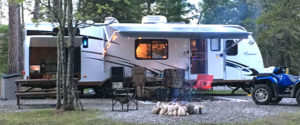 Our RV camping season is just around the corner, so many of us are getting ready! There are approximately 355,000 new RVs sold each year, so many RVers hitting the road this season are totally newbies.
Our RV camping season is just around the corner, so many of us are getting ready! There are approximately 355,000 new RVs sold each year, so many RVers hitting the road this season are totally newbies.
After you get the hang of it, RV camping is one of the most enjoyable, rewarding, and relaxing experiences you will ever have. Our goal is to help you prepare to go on your first adventure with your RV by putting together this guide!
Checklists:
If you’re a new RV camper, checklists can be a lifesaver! Making a few checklists and keeping them on hand is a good idea until you get the hang of things.
Making a packing list will help you not to forget any essential items. As you go on more trips, you’ll learn what you need and don’t need, and what you bring but never use.
Make a list of all the things you need to do before you go… this might include packing, ensuring that your home is ready for a vacation and all the appliances are turned off and other things like:
- Checking the RV tires
- Making sure the awning is pulled in (you’d be surprised how many people miss this and lose their awning)
- Making sure the RV Jacks are pulled up
- Everything is latched and secured
- All passengers are accounted for, etc.
A setup checklist will ensure that you don’t make mistakes like forgetting to connect the sewer hose for the shower once you’ve arrived at camp. A checklist for setting up a camp should include the following:
- Leveling the RV
- Securing Wheels
- Hooking up Water
- Hooking up Sewer
- Setting up Pop-Ups or Opening Slides
- Setting up lawn chairs/outside area
Walkaround:
No matter how old or in what condition your RV or travel trailer is, you should get in the habit of doing a walkaround every time you stop. Every time you stop at a gas station, grocery store, or campground, look around your RV for obvious problems. When you travel down the road, you are subjected to a lot of vibrations. Make sure your tires are in good shape, your storage bins are latched, and there are no obvious signs of trouble. An easy and quick walkaround could save you a whole lot of headaches down the road.
Driving Tips:
If you’re driving a motorhome or pulling a trailer, the driving experience is going to be different than if you were in just a normal vehicle on a daily basis.
RVs and trailers are both large and wide – you will need to use your mirrors to help you see. Make sure your mirrors are in the proper position for driving and learn how to use them. In general, one mirror helps you see traffic behind you, while the other shows where your RV or trailer tires are, as well as some of your blind spots. Making turns is easier if you know where your RV or trailer tires are in relation to you, the driver, and in relation to curbs. You will also be able to stay within your lane with these mirrors – your truck is much wider than a standard vehicle.
Keep a slow speed and start braking earlier than you would in a car – an RV or travel trailer weighs more and requires a longer stopping distance. Don’t ride the brakes while going downhill. Shift down and let the engine do the work, not your brakes. When downgrading, tap the brakes for a few seconds at a time to prevent overheating.
Protect Your RV:
As an RV owner, you want to enjoy your investment for years to come. In addition to insurance and preventative maintenance, RVers also use a few devices to provide themselves with additional protection and peace of mind.
- Surge Protector: A surge protector protects your system from power surges by plugging it between the rig and an external power supply. In the event of a power surge from lightning or bad campground wiring, it will protect your rig from electrical damage. It monitors the quality of the power source, protects your rig from ungrounded connections, and will prevent your rig’s electrical system from getting fried. It is a small investment that can help you save your entire electrical system! To ensure that it does not get stolen, you can purchase a lock.
- An TPMS, or tire pressure monitoring system, can notify you of potential tire hazards you might otherwise overlook. Tire pressure and temperature sensors are available for RVs and travel trailers alike and provide alerts when the conditions change. In this way, blowouts and rig damage can be prevented.
